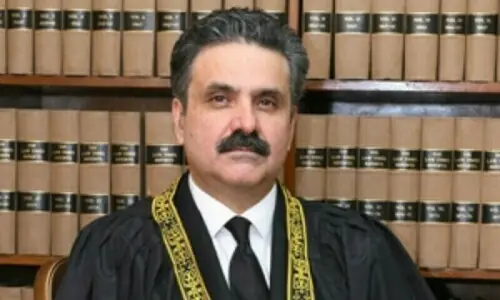ISLAMABAD: Former prime minister Nawaz Sharif has challenged his conviction in the Al-Azizia/Hill Metal Establishment reference in the Islamabad High Court (IHC), claiming that the accountability court’s verdict in the case is marred with flaws and legal lacunas.
Mr Sharif filed on Tuesday an appeal in the high court through his counsel Khawaja Haris Ahmed. The former prime minister, who is currently serving a prison sentence, also filed an application seeking suspension of the sentence.
Accountability court Judge Mohammad Arshad Malik had on Dec 24 convicted Mr Sharif in the Al-Azizia Steel Mills Company (ASCL) and Hill Metal Establishment (HME) reference and awarded him seven years imprisonment and imposed a fine of Rs1.5 billion and $25 million.
Appeal filed in Islamabad High Court says accountability court’s verdict is marred by flaws and legal lacunas
Judge Malik held that the former prime minister was the beneficial as well as real owner of both the companies since he received about 88 per cent profit of the HME.
The appeal pointed out certain ‘extraneous’ factors which, it said, an accountability judge never considered while imparting judgements in routine cases. For example, the appeal identified para 13 of the judgement and contended that “the learned trial judge has proceeded to pass generalised and sweeping remarks lamenting about rampant increase in corruption in the society”.
The appeal said: “In doing so the learned trial judge has not only betrayed his inherent bias and predisposition while deciding the case against the appellant, he has also exceeded his jurisdiction as a trial judge, in that such generalised remarks and sweeping statement have no relevancy for purpose of deciding the guilt or innocence or an accused in a criminal trial as such a decision is to be taken strictly in accordance with law, which requires the court to confine itself within the parameters of the charges framed in the case, the admissible evidence brought on the record and proved in accordance with law, rather being influenced by his own subjective perception and observations.”
The appeal said the socialist and class divisive observations made by the trial judge in para 14 of the judgement were extraneous to the record of the case. “Such an observation indicates an inevitable pre-disposition of the mind of the learned judge in harbouring an inherent bias towards the more affluent people of the society,” it added.
The appeal said: “Not only the aforesaid observations of the learned trial judge are in derogation of the principles governing administration of criminal justice in Pakistan, and of the principle of fair trial as guaranteed to all citizens of the country by virtue Article 10-A of the Constitution…[these] are tantamount to condemning the appellant even before considering whether evidence brought on the record is sufficient to hold him guilty of committing any offence as charged.”
It further noted: “As a matter of fact the observations made by the learned trial judge in paras 13 and 14 of the impugned judgement are neither based on any evidence produced during the trial, nor did the learned trial judge otherwise have any jurisdiction under the law to make any such observations while pronouncing the judgement in a criminal trial, rather making of these observations is tantamount to, it is submitted with respect, politicising of the justice system, is in breach of the appellant’s fundamental right to fair trial”.
Another ground of the appeal was that the accountability court presumed Mr Sharif as owner of the ASCL and HME on the basis of remittances made to him by his son Hussain Nawaz through the HME.
The appeal, while referring to Section 5(d)(i) of the National Accountability Ordinance (NAO), 1999 (which says one who has enjoyed from the benefit of an asset, but does not qualify him to be the ‘owner’ of the asset from which such remittances may have originated), said that the “receipt of remittances by the appellant from his son or his sole proprietorship i.e. HME, is the benefit the appellant has enjoyed”. Therefore, it added, “the appellant may thereby fall within the category of an ‘associate’ as defined in section 5(d)(i) of NAO, 1999, but not as an ‘owner’ of HME”.
Likewise, the appeal pointed out that the accountability judge had used a word “beneficial owner” for the accused despite the fact that this word was never mentioned in the NAO. As per the appeal, the accountability judge discarded the money trail and rejected the letters written by Qatari Prince Sheikh Hamad bin Jassim bin Jaber Al-Thani to the Supreme Court, confirming the Sharif family’s AED12 million investment with his grandfather without any deeper appreciation of the relevant record.
The appeal contended that the judge relied upon the evidence while ignoring the legal objection of the defence counsel.
Published in Dawn, January 2nd, 2019

































